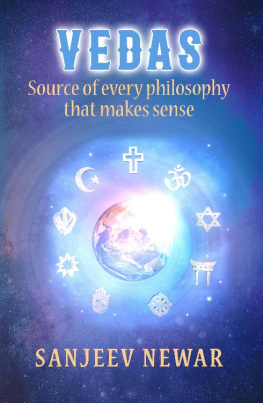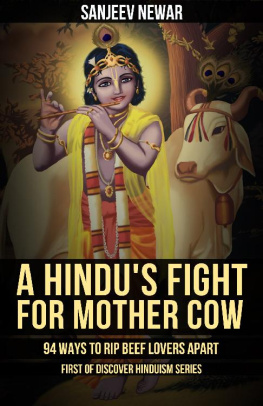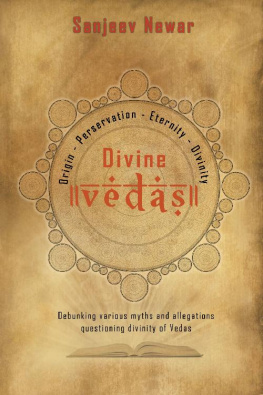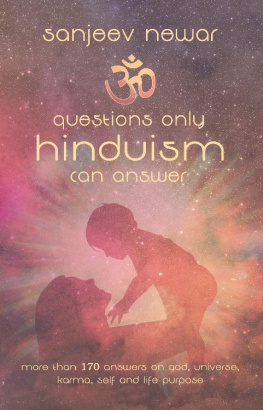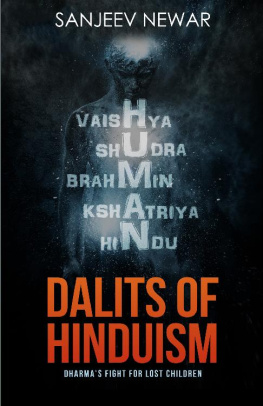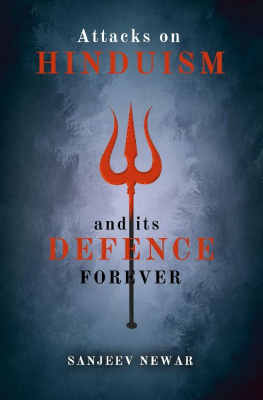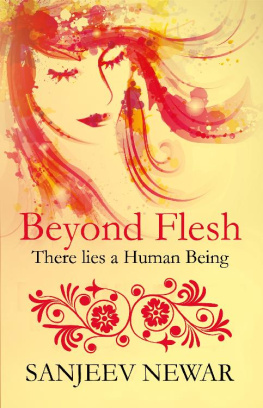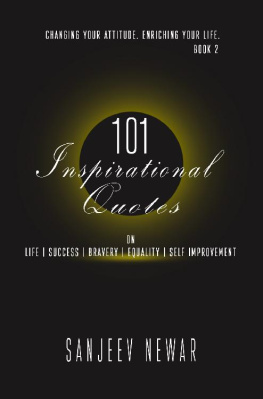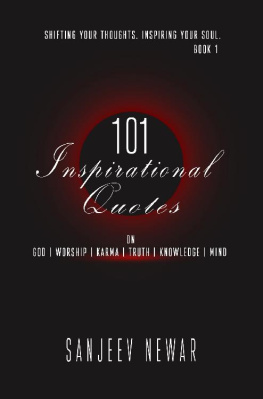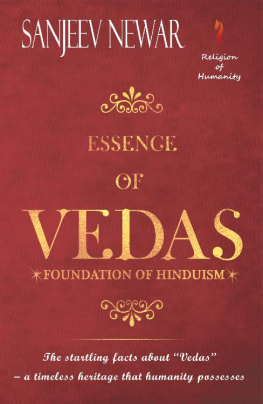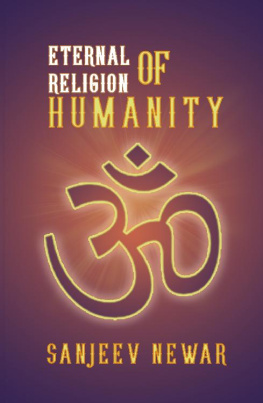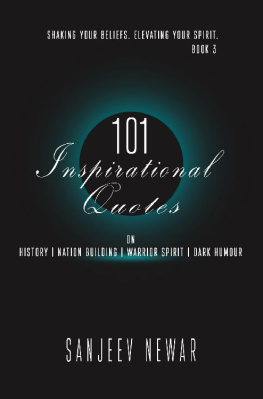Sanjeev Newar - Vedas - Source Of Every Philosophy That Makes Sense (Religion of Humanity Book 3)
Here you can read online Sanjeev Newar - Vedas - Source Of Every Philosophy That Makes Sense (Religion of Humanity Book 3) full text of the book (entire story) in english for free. Download pdf and epub, get meaning, cover and reviews about this ebook. publisher: Agniveer, genre: Religion. Description of the work, (preface) as well as reviews are available. Best literature library LitArk.com created for fans of good reading and offers a wide selection of genres:
Romance novel
Science fiction
Adventure
Detective
Science
History
Home and family
Prose
Art
Politics
Computer
Non-fiction
Religion
Business
Children
Humor
Choose a favorite category and find really read worthwhile books. Enjoy immersion in the world of imagination, feel the emotions of the characters or learn something new for yourself, make an fascinating discovery.
- Book:Vedas - Source Of Every Philosophy That Makes Sense (Religion of Humanity Book 3)
- Author:
- Publisher:Agniveer
- Genre:
- Rating:3 / 5
- Favourites:Add to favourites
- Your mark:
- 60
- 1
- 2
- 3
- 4
- 5
Vedas - Source Of Every Philosophy That Makes Sense (Religion of Humanity Book 3): summary, description and annotation
We offer to read an annotation, description, summary or preface (depends on what the author of the book "Vedas - Source Of Every Philosophy That Makes Sense (Religion of Humanity Book 3)" wrote himself). If you haven't found the necessary information about the book — write in the comments, we will try to find it.
Vedas - Source Of Every Philosophy That Makes Sense (Religion of Humanity Book 3) — read online for free the complete book (whole text) full work
Below is the text of the book, divided by pages. System saving the place of the last page read, allows you to conveniently read the book "Vedas - Source Of Every Philosophy That Makes Sense (Religion of Humanity Book 3)" online for free, without having to search again every time where you left off. Put a bookmark, and you can go to the page where you finished reading at any time.
Font size:
Interval:
Bookmark:
VEDAS
Source Of Every Philosophy
That Makes Sense
Other Books by Author
The Science of Blissful Living
Essence of Vedas
Questions Only Hinduism Can Answer
Divine Vedas
A Hindu's Fight for Mother Cow
Attacks on Hinduism And its defence forever
Beyond Flesh there lies a human being
Dalits of Hinduism
Practical Guide to Moksha
Conversations on Yoga
The Art of Resume Making
VEDAS
Source Of Every Philosophy
That Makes Sense
Know how all true philosophies echo the spirit of Vedic religion
SANJEEV NEWAR
Vedas - Source Of Every Philosophy That Makes Sense
Copyright 2018 by Agniveer
All rights reserved. This publication may not be reproduced, stored in a retrieval system, or transmitted in whole or in part, in any form or by any means, electronic, mechanical, photocopying, recording, or otherwise, without the prior written permission of Agniveer.
For information contact
books@agniveer.com
Book Design and Composition by Ronak Trivedi
First Edition: May 2018
There is a famous phrase in Rigveda Ekam Sadvipra Bahudha Vadanti ( ) that means Wise people explain the same truth in different manners.
The objective of this chapter is to adopt this spirit and reconcile the apparent differences among various philosophies and prepare ground for their unity. Lack of unity among the wisdom oriented population of the world isone reason why foolish / wily forces appear to be dominating. And hence, especially in the present turbulent era, it becomes utmost important that we seek commonalities rather than espouse differences.
Bharat (now known as India) has been the birthplace of many great philosophies. Philosophy seems to be a second nature of this geography. You would find a philosopher in every other Aam Admi on the street. Hence, it becomes utmost necessary to differentiate philosophies of the wise from philosophies of the unwise.
This Rigveda message acts as a double-edged sword. If we use it as a ploy to compromise and seek commonality with views of every other person, we may end up having a large pile of garbage without anything substantial. Unfortunately, that is what mostly happens. The grounds of compromise are too hollow and sketchy. They are restricted to populist slogans and hence true unity never comes. It remains an opportunistic alliance that breaks down on every other pretext.
My interest in spiritual philosophies began around the same time a child realizes what death is and sees people closing their eyes and not coming back to hug them again.
I studied all major philosophies to find out what happens after the eyes close. I practiced different methods.
Then I discovered Vedas and found them to contain the source-code that empowers every philosophy that made sense.
Vedas gave me an approach to look beyond the apparent contradictions in these philosophies and see how they all speak the same truth in different lingos.
I wrote this book so that a truth-seeker like me, who knows his time is limited in this world before the eyes close forever, can convincingly define his direction than be confused over which is a better philosophy.
All major philosophies have the same common source and destination. I hope I am able to exhibit this in this small book.
The book is different from usual books on philosophies due to my deliberate attempt to eliminate all jargons that flower a typical book on this subject. My focus is to make things as simple and intuitive as they are, so that we waste less time showcasing and appreciating intellectualism, and invest more time in making best use of remaining time in life to prepare for whatever comes after the eyes close.
Tameva Viditvaati Mrityumeti, Nanyah Pantha Vidayate Anayay!
This knowledge alone can defeat death. Nothing else works.
Sanjeev Newar
May 2018
Somewhere in this infinite universe.
Chapter 1
I n this chapter, we would attempt to create the ground for unity among all major spiritual philosophies based on truly firm principles. For sake of readability, we will keep the language simple and avoid cryptic references. It is perhaps the first time that such a holistic view of various philosophies is being presented in this manner. If there are errors, I humbly accept it, as the motto has always been we do not attempt to provide the final truth in a capsule. We merely try to show the path for each of us to explore.
There are several obvious and not-so-obvious reasons:
All philosophies start with an attempt to model the perceptions of the world in a manner that we can understand them easily and generate lessons for future.
To model the perceptions and be able to communicate them we need to have the following:
- Certain definitions to define the entities.
- Certain frameworks that establish relationships among these entities.
- Certain generalized principles based on these frameworks.
Often the same words are used to define different things in different philosophies. The use of same words to define different things is the first prime source of contradictions.
Students of philosophy are found fighting mostly over what is God and what is the soul. The reality is that God and soul are definitions. Depending upon how we define these entities, the relationship between soul and God would differ.
Please note that truth is beyond definitions.
Definitions are merely means to comprehend the truth better through our bounded intellect by using frameworks and developing fundamental principles.
An added advantage is that definitions help us exchange each others experiences so as to enhance our understanding better.
When someone says turmeric is good for teeth, we all understand what turmeric is and what is teeth, and hence, we can derive benefits from these definitions. Had there been no such definitions or each of us would have defined teeth differently, we might have been suffering from a severe toothache even though remedy was simple!
Coming back to definitions in philosophy, while there is rough standardization in definitions of entities like God, soul, salvation, there are enough differences to cause disputes.
It is like a field of Finance where Return on Capital Employed (ROCE) is a popular ratio used to evaluate the efficiency of a company. However, there is no unanimity over what Capital would exactly mean. For some companies, Capital includes short-term loans as well. For others, even long-term loans are not included. Different experts come with different numbers of the same ratio. Often there are debates and even PhDs on what should be right definition of Capital for a particular industry. However, the point is that Capital still remains a definition. If we apply the same definition of Capital on manufacturing firms as well as a bank, we would have totally meaningless comparative analysis.
This meaningless debate does acquire centerstage in the field of philosophy. Perhaps because most students of philosophy are not very comfortable with scientific approach! They waste time arguing about definitions rather than analyzing the concepts. Modern science is smarter in this regard. The first step in modern science is to clearly define the terms in as much specific detail as possible. This emininates all debates due to subtle differences in what you and I may interpret a word to be.
For example, energy in science is not any divine power, neither a feeling of enthusiasm. It is product of Force and Displacement. Force is, again, not the impact of your punch. Force is mass multiplied by acceleration.
Next pageFont size:
Interval:
Bookmark:
Similar books «Vedas - Source Of Every Philosophy That Makes Sense (Religion of Humanity Book 3)»
Look at similar books to Vedas - Source Of Every Philosophy That Makes Sense (Religion of Humanity Book 3). We have selected literature similar in name and meaning in the hope of providing readers with more options to find new, interesting, not yet read works.
Discussion, reviews of the book Vedas - Source Of Every Philosophy That Makes Sense (Religion of Humanity Book 3) and just readers' own opinions. Leave your comments, write what you think about the work, its meaning or the main characters. Specify what exactly you liked and what you didn't like, and why you think so.

